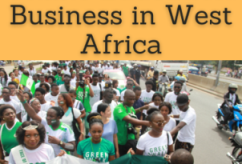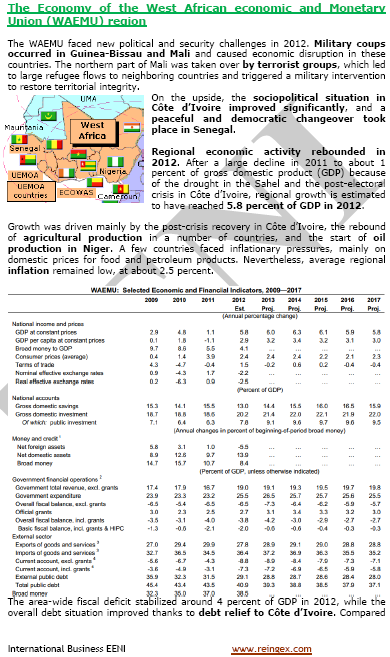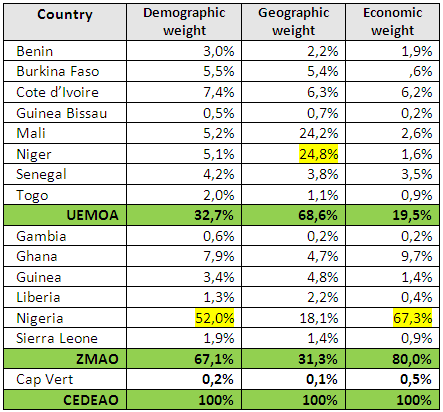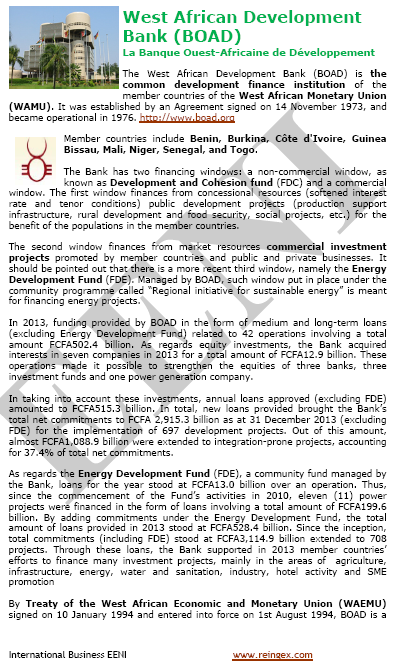West African Economic Union

CFA Franc - West African Economic and Monetary Union (WAEMU) Senegal, Togo, Mali, Niger
- Introduction to the West African Economic and Monetary Union (WAEMU/UEMOA)
- Objectives, Functioning and Institutions of the West African Economic and Monetary Union
- Members economies of the WAEMU: Benin, Burkina Faso, Ivory Coast, Mali, Niger, Senegal, and Togo
- Activities carried out and policies implemented by the WAEMU
- Community Competition Policy
- Legal Framework: WAEMU Treaty
- Achievements of the Economic and Monetary Union of West Africa
- Common Market
- Common External Tariff
- Sectoral Policies
- African Monetary Zone (WAMZ). CFA Franc
- West African Monetary Institute
- Case Study: Opportunities for Increasing the Cross-Border Trade in the Banking Sector
- Political Context of the WAEMU
- Structural Competitiveness of the WAEMU Countries
- Economy of the WAEMU
region
- Economic profile of the WAEMU's Member States
- Case Study: Impact of Malian crisis on WAEMU
- Customs Union of the WAEMU
- WAEMU's Institutions;
- Central Bank of West African States (BCEAO)
- West African Development Bank (BOAD)
- Cauris Management (private equity fund manager)
- Guarantee Fund for Private in West Africa (GARI)
- Case Study: Banking sector in the WAEMU region
- WAEMU countries and AGOA
- Business in the West African Countries
- WAEMU-U.S. Agreement
The objectives of the subject “West African Economic and Monetary Union (WAEMU/UEMOA)” are the following:
- To understand the purposes and functions of the WAEMU
- To know the WAEMU Treaty
- To assess the benefits for the member countries of the WAEMU
- To analyze the economic context of the WAEMU
- To analyze the economic integration process (Common Market, Common External Tariff) and the foreign trade among the West African Economic and Monetary Union member states
- To know the WAEMU Customs Code
- To explore the financial and banking system of the UEMOA and the role of the Central Bank of the West African States
- To analyze the role of the affiliated institutions of the WAEMU

The Subject “West African Economic and Monetary Union (WAEMU)” belongs to the following Online Programs taught by EENI Global Business School:
Masters: Business in Africa, International Business, Foreign Trade.
Doctorate: African Business, World Trade.

Languages:  or
or  Union Économique et Monétaire Ouest Africaine (UEMOA)
Union Économique et Monétaire Ouest Africaine (UEMOA)  Unión Económica y Monetaria del África Occidental (UEMOA)
Unión Económica y Monetaria del África Occidental (UEMOA)  União Econômica e Monetária do Oeste Africano (UEMOA).
União Econômica e Monetária do Oeste Africano (UEMOA).
- Credits of the Subject “West African Economic and Monetary Union (WAEMU)”: 2

- Duration: two weeks
Area of Knowledge: Africa.

WAEMU - West African Economic and Monetary Union
In 1994 was created the WAEMU by seven West African Countries using the CFA Franc (common currency): Benin, Burkina Faso, Ivory Coast, Mali, Niger, Senegal, and Togo.
Guinea-Bissau became a member of the WAEMU in 1.997.
All these countries share a common currency, the CFA Franc.
The main objectives of the West African Economic and Monetary Union are to intensify the economic and financial activities competitiveness of the West African Economic and Monetary Union economies, developing an open and competitive market and a harmonized legal environment.
The West African Economic and Monetary Union has implemented a common market based on the free movement of persons, goods, services, capital, and the right of establishment.
The WAEMU has achieved several objectives (harmonization of laws, common policy, free movement, competition rules), but some obstacles, and even delay, are slowing the integration process.
A portion of the common external tariff (CET) - entered into force in 2000- the WAEMU is used to finance the institution.
The West African Economic and Monetary Union Inter-Parliamentary Committee adopted a draft treaty on the creation of a regional parliament.
West African Economic and Monetary Union (WAEMU):

West African Economic and Monetary Union (WAEMU).
- Area: 3,509,600 km²
- Population: 112 million people
- Growth rate: 3%
- Nominal GDP: 24,332.6 billion FCFA
- Real GDP (at constant prices): 18,458.8 billion FCFA
- Real GDP growth rate: 5.8%
- Annual inflation: 2.5%
- Main religions: Islam and Christianity
- Military coups in Mali and Guinea-Bissau
- Economic recovery of Ivory Coast

The economies of the Member States of the Economic and Monetary Union of the Africa West (WAEMU) suffered from an unfavourable global environment, characterized by high food products prices derived from petroleum, as well as the global crisis.
The Central Bank of West African States (BCEAO) is the financial institution of the eight Member States of the West African Monetary Union. The Central Bank of the West African States is an international public institution based in Dakar.
The West African Development Bank (BOAD) is a common institution created to finance the economy development in West African Monetary and Economic Union. It was created on November 1973. Its Member States are Benin, Burkina Faso, Ivory Coast, Guinea-Bissau, Mali, Niger, Senegal, and Togo.
The Economic and Monetary Union of the Africa West (WAEMU) belongs to the West African Economic Area.
See also: West African Monetary Zone (WAMZ).
West African Ports: Dakar, Abidjan, Cotonou, and Lomé.
Trans-African corridors:




